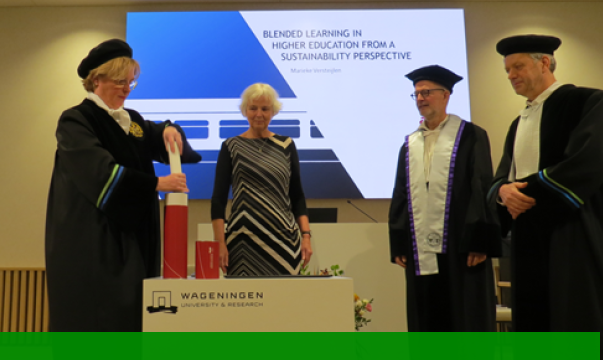
On December 12th Marieke Versteijlen of Avans Hogeschool successfully defended her thesis at the Wageningen University. Marieke was co-supervised by myself and Transportation Scientist Prof. Bert van Wee of Delft University in the aula of Wageningen University. The thesis was approved and discussed by a committee consisting of Prof. Taeke Tillema of Groningen University, Prof. Arnold Brecht, Dean of Educaiton, Wageningen University, Dr. Sally Windsor of Gothenburg University in Sweden and Dr. Wim Lambrechts of the Open University of The Netherlands.
Marieke’s research addresses the high environmental impact of students commuting to the higher educational institution (HEI) by exploring the potential of digital technology to lower the travel movements of students.
The research explores how on-campus and online education can be balanced in a blended learning design to decrease student commute without compromising educational quality. By applying a form of Educational Design Research (EDR), involving key HEI stakeholders, guidelines and principles were found that can support the design of blended education to simultaneously meet these environmental and educational requirements.
The three stages of EDR were followed to design the sustainable blended intervention, exploration, construction and reflection. In the exploration stage, the environmental impact of students commuting to and from campus was explored across several Dutch HEIs and compared with international research on HEIs’ carbon footprint, confirming its large contribution. Also showing that only a few Dutch sustainability and ICT professionals recognized the potential of online learning to lower carbon emissions due to student commute.
After establishing the environmental impact of student travel, the considerations and (de)motivators of Dutch students influencing their travel mode choices and their decisions about whether to travel to their institution or to study online were explored. Their travel mode choice is mostly based on habit and influenced by travel-regulating measures of the Dutch government (a free public transport permit) and HEIs (high parking costs). Their decision to make a trip to campus seems to be a reasoned choice, influenced by the number and time of the day of their scheduled classes, the type of learning activity and their perceived study abilities.
In the construction stage, design principles and associated recommendations were developed to design sustainability-oriented blended education through a realist review and by cooperating with a team of eight educational professionals to design a blended study programme. Lecturers can use these design principles to guide and assess the quality of a blended learning unit. The acquisition of sustainability competencies by the students was considered one of the aspects of educational quality. The implementation of the prototype was severely impacted by the COVID-19 pandemic in 2020. The government restrictions changed the intended blend to mainly online education. Instead of measuring student travel emissions as a result of the design, a possible attitude change of students toward online learning and commuting that might have been caused by going through a period of primarily online learning due to COVID-19 restrictions, was studied. The students experienced that online meetings can be productive and efficient, and less time is lost in travel. Both were appreciated by the students.
This research adds a sustainable perspective and a step toward a detailed pedagogical framework to what is already known about blended learning. Although we could not measure the impact of a blended learning design on student travel emissions due to COVID-19, there are strong indicators that a blended learning design can be used to decrease its environmental impact by reducing student commute. The findings of this study can contribute to a whole-institution approach embedding sustainability in all aspects of the institution.
The entire thesis is available through open access through the Wageningen Library as are the four peer reviewed papers that all have been published.
